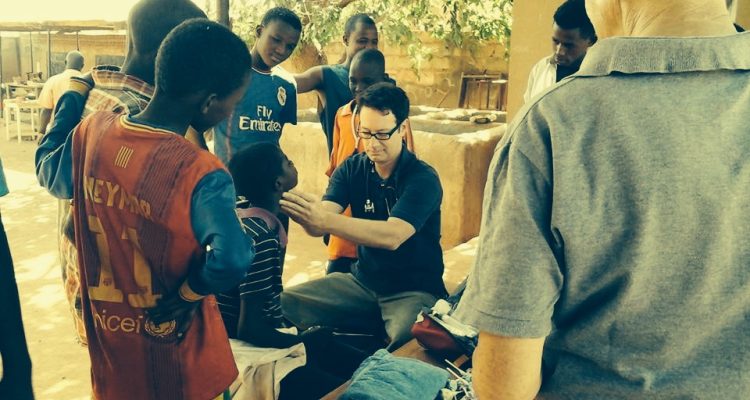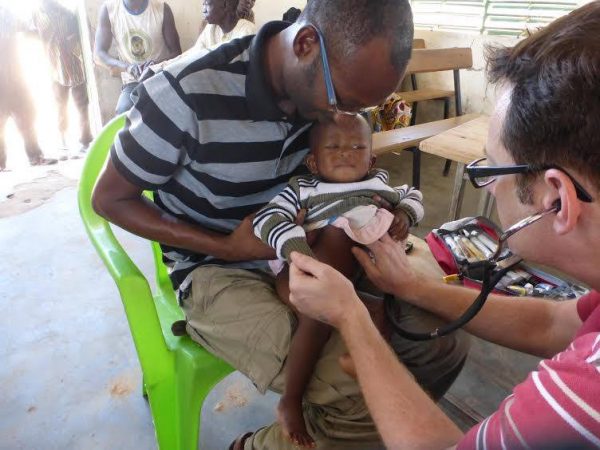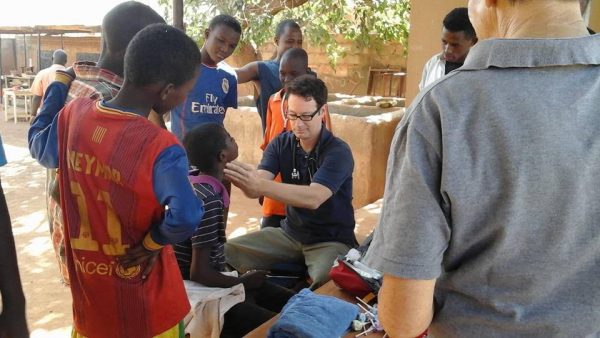While many were spending Thanksgiving eating turkey and watching football, Wheeling Jesuit University’s Dr. Bryan Raudenbush, professor of Psychology, along with his mother and stepfather, flew 14 hours to Africa providing medical care to the less fortunate.
Through Wycliffe Associates, a volunteer group, Raudenbush traveled to the Burkina Faso province of Africa, where he assisted in testing and providing health care to young and old. At the same time, his mother worked in translation services, while his stepfather, emeritus professor of Animal Sciences at Montana State University, taught the locals how to raise cattle.
The experience, he said, “was great, because of the number of children and adults we were able to give care to during our trip.”
“Providing service is part of the culture at Wheeling Jesuit – it’s our mission. As a faculty member, going out and living what we try to instill in our students shows we live the mission too,” Raudenbush explained.
During the trip, Raudenbush worked at several clinics, a school for underprivileged children, a boys’ shelter and a small village. In all, Raudenbush said, he couldn’t keep track of the number of patients he treated. After the first day, he lost count.
“The accommodations at each of the sites were pretty basic. We treated anything from broken bones to dehydration to mental health consultations. In the primary clinic where I worked most of the time there was frequently no running water, they had an old x-ray machine that sometimes worked and sometimes didn’t, and for them a band-aid was a luxury,” Raudenbush added.
The “Les Enfants de L’Espoir” boys’ shelter takes in young boys who were cast away by their families. This was the second stop on the trip.
“The backstory is that because of severe poverty and limited food, it is not uncommon for a family to send the youngest son into the streets to beg for money. They are known as ‘can kids.’ If they don’t bring in enough money they could be beaten or sent away,” he explained.
The shelter, Raudenbush said, offers the boys a place to live, food and training in carpentry and French. Their families are offered bags of rice, a goat, chickens or some other tangible items in exchange for allowing the shelter to raise them.
Subscribe to Weelunk“When I arrived, there were about 25 boys ranging in age from 5 to 16. I did basic health screenings and provided care for those that I could,” he added. “After all the checkups, I was surprised that they were in relatively good condition given their circumstances. Still, there were definite signs of decreased physical development and a general failure to thrive.”
At the school for underprivileged children, Raudenbush said this was the first time many of the children had a health screening or treatment in their life. He provided eye tests, did protein screenings and tested and treated for malaria.
The final stop on his trip was a small town about two and a half hours from their base. At this location, Raudenbush treated people of all ages in a one-room building that also serves as a local church.
“The local preacher sent out a message to the villagers that someone would be providing health care and the line started forming immediately. I saw more than 70 people in one day– most with respiratory issues related to the dry, dusty conditions in the village, joint problems from a life of working 15 hour days in the fields and severe ingestional issues related to drinking the same polluted water as their livestock do,” he explained.
The trip to Africa was a first for Raudenbush, who had been on about a half dozen service trips to Central and South America in the past.
“I took a huge backpack full of medical supplies. It was pretty heavy when I left and significantly lighter after two weeks. We rarely reflect upon and appreciate how well we have it here in the United States until you go somewhere like this, and see entire villages living in shacks and wondering where their next meal will come from,” he said.
In the midst of poor living conditions, Raudenbush said the people were appreciative of anything he could do to help them. “They were always so calm and pleasant even when they stood in the hot sun for many hours.”
As the holidays approach, Raudenbush said, many people are talking about what they would like to receive or ‘need’ for Christmas.
“The people I spent those two weeks with are just trying to survive. What they ‘need’ are the basics to get them through tomorrow. Going on a trip like this is something everyone should experience, and I urge everyone to give to their favorite charity this season to make a brighter future for someone’s tomorrow.”




